Dr Harran Ray passed his viva on 24th November 2022 after a 4-year journey that involved experiments that span between few milliliters to 120 cubic meters!
His PhD thesis is titled “Mechanical performance and upscaling of bioimproved soils”.
Funding
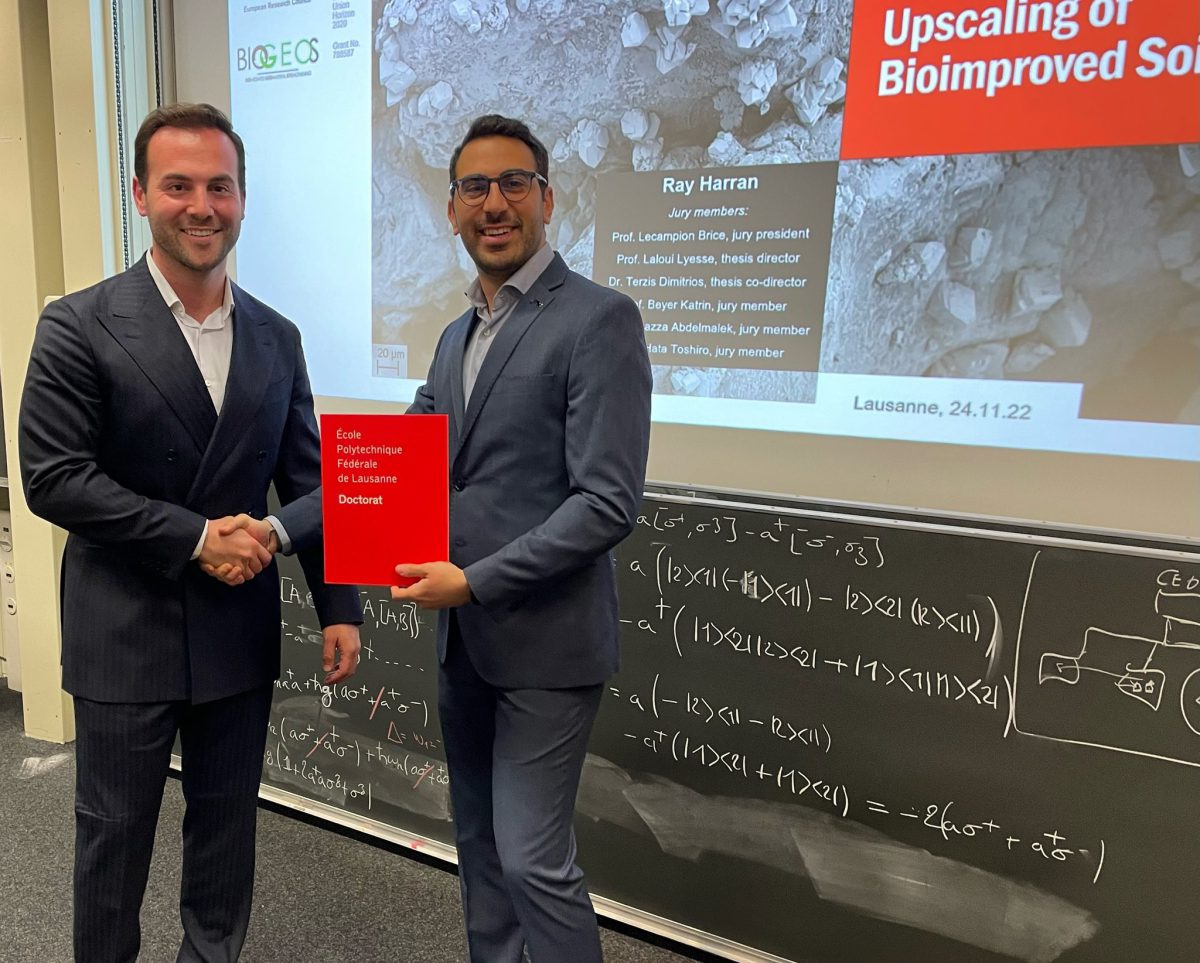
Dr Harran Ray passed his viva on 24th November 2022 after a 4-year journey that involved experiments that span between few milliliters to 120 cubic meters!
His PhD thesis is titled “Mechanical performance and upscaling of bioimproved soils”.
Funding
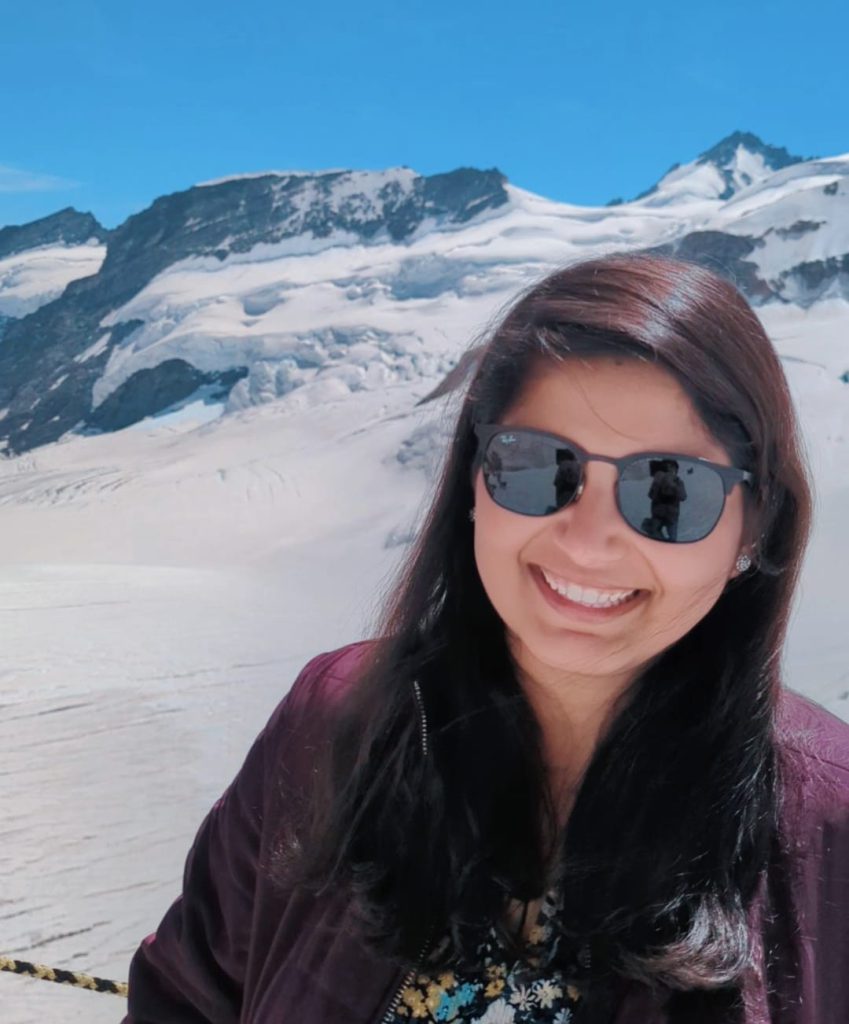
It was a great pleasure to welcome at BIOGEOS and EPFL Dr. Nimisha Roy as an academic guest. Dr. Roy is Postdoctoral Fellow in the Geosystems group of the School of Civil and Environmental Engineering at Georgia Tech, US. She received her Ph.D. degree in Computational Science and Engineering from Georgia Tech in December 2021, under the supervision of Prof. David Frost. Her Ph.D. thesis, funded by US National Science Foundation, focused on characterizing the three-dimensional pore space architecture of particulate materials and its applications in the mechanics of geomaterials and biocemented sands under static and dynamic loading. Dr Roy has received several awards as a graduate student and undergraduate instructor at Georgia Tech. She has published over 20 journal and conference papers. From Fall 2022, she has been appointed as a Lecturer in the College of Computing at Georgia Tech.
Dr Roy stayed at the Laloui Group this summer for 1.5 month and worked on applying her computational approaches to the characterization of the 3D pore and contact network of bio-cemented granular packings. She has also presented her work in this field, in collaboration with Dr Dimitrios Terzis, at AGU Fall 2021 Conference. On 4th of July she presented her contributions to research at a seminar attended by the Laloui Group.

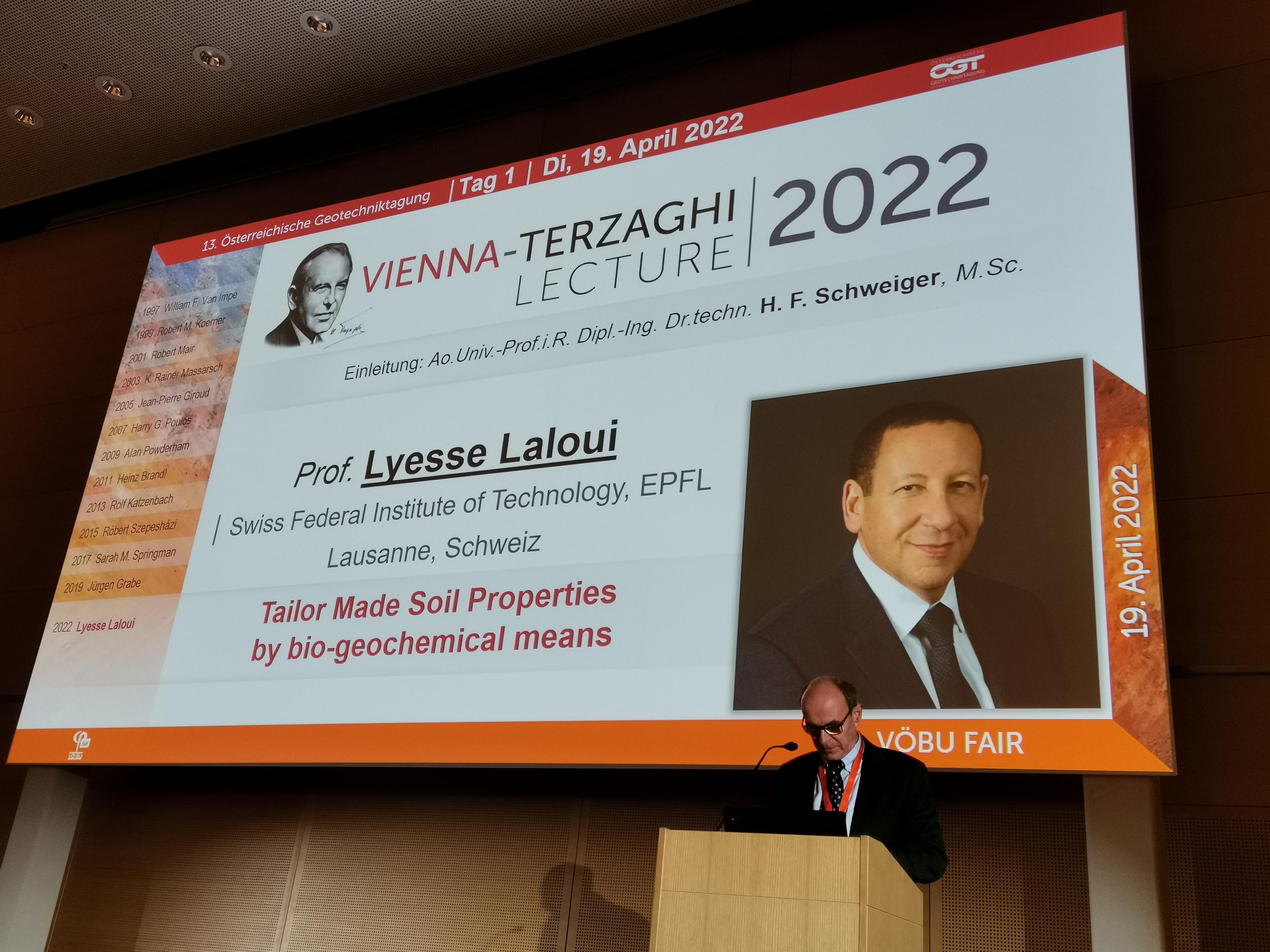
The Vienna Terzaghi Lecture 2022 has been awarded to, and presented by, Professor Lyesse Laloui of EPFL at this year’s Austrian Geotechnical Conference on the 19th of April. Since 1997, the combined lecture and award have been given biennially to internationally renowned geotechnical engineers by the Association of Austrian Drilling, Well Construction and Foundation Engineering Companies (VÖBU), the Austrian Association of Engineers and Architects (ÖIAV), the Austrian National Committee (ASMGE) of the International Society for Soil Mechanics and Geotechnical Engineering (ISSMGE) and the Institute of Geotechnics, Foundation Engineering, Soil and Rock Mechanics at the University of Vienna.
This year’s winner, Professor Laloui, is Chair Professor of Soil Mechanics and the European Vice President-elect of the International Society of Soil Mechanics and Geotechnical Engineering (ISSMGE). His lecture titled, “Tailor-made soil properties by bio-geochemical means” presented his latest research on the multiphysical analysis of bio-cementation processes in nature and their practical engineering applications.
The lecture is named in honor of Karl von Terzaghi, who is considered the founding father of soil mechanics, a field of engineering exploring the mechanics of soils and its application in geotechnical engineering. His radical work on the properties of soils led him to develop unifying concepts on earth pressure and slope stability.
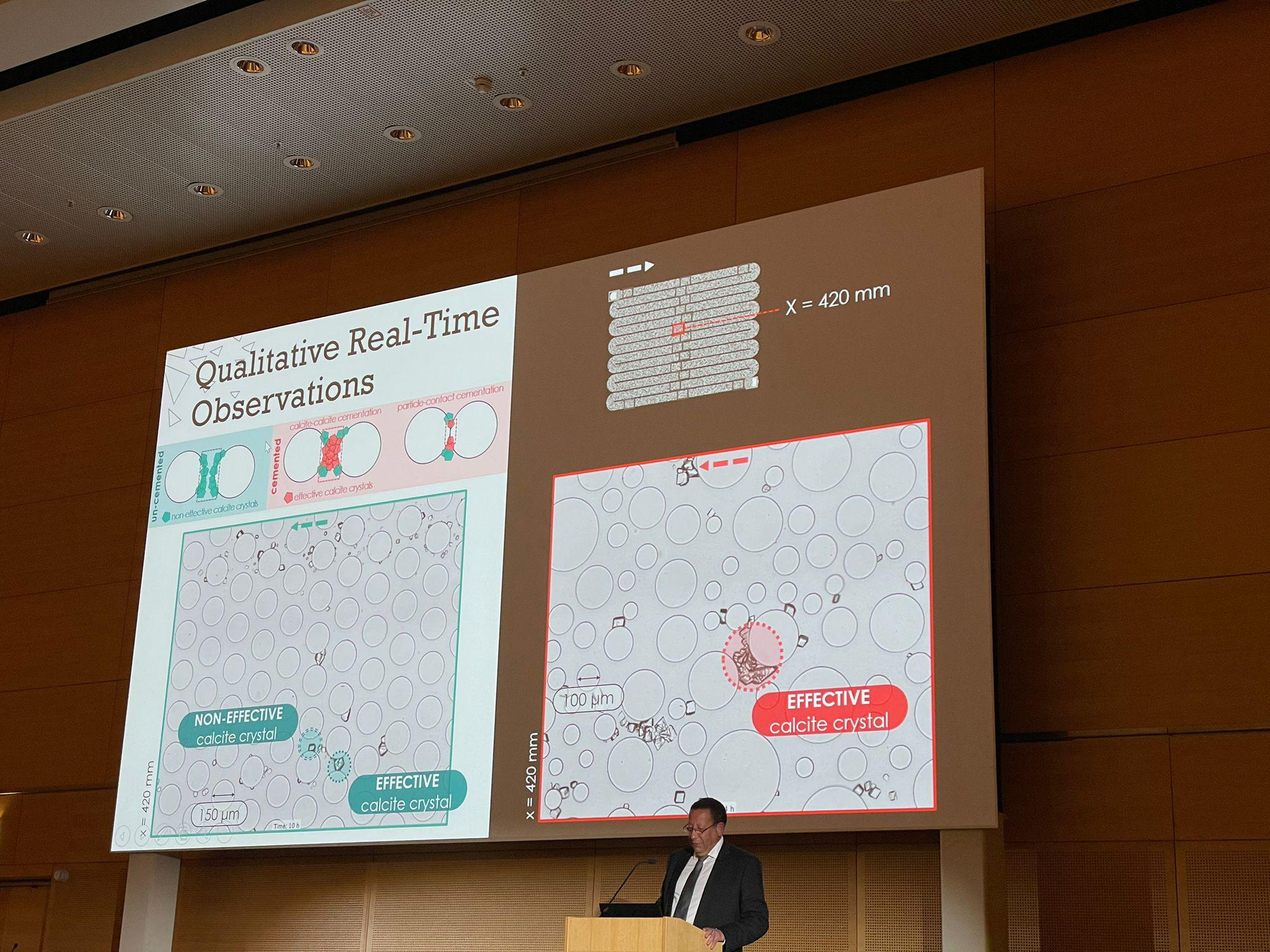
Throughout his distinguished career, Professor Laloui has looked to apply and build upon the fundamentals that Karl Terzaghi developed. Terzaghi observed, “Rainfall-induced pore pressure hike is not the cause of landslides, but a contributing factor. There were many higher hikes in the geological past! The cause is long-term gradual, cumulative chemical weathering which weakens inter-granular bonds which leads to decrease of cohesion”.
These pioneering ideas became the foundational theory behind Laloui’s latest research project BIOGEOS, an ERC-funded exploration of the interaction between water and soils which, rather than decreasing the cohesion as described by Terzaghi, strengthens it through natural bio-cementation.
Author: Brendan Smith
Source: Soil Mechanics Laboratory

Our team is so proud for the warm welcome our webinar and its interactive nature received from our community! Thank you for attending and for your follow-up questions and messages! We look forward to meeting you at our next webinars!
Update: The highlights of our webinar our now available online:
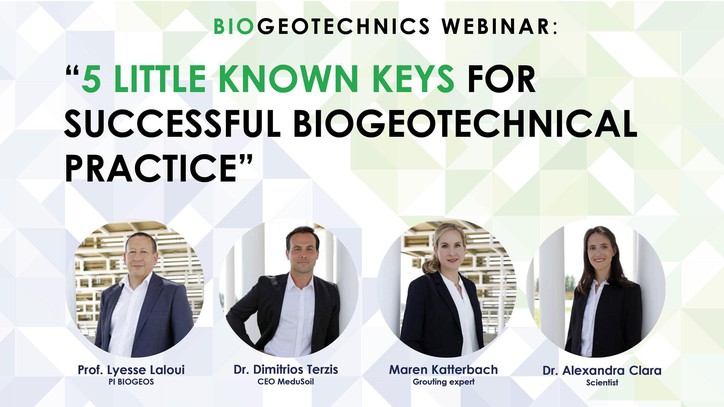
Abstract:
The vast majority of infrastructure assets are constructed with or on unsuitable soils, which must be improved prior to, or after, construction. Conventional ground improvement technologies have historically relied on cement- and petroleum-based materials, perceived as straightforward commodities. This view can no longer be sustained due to the large volume and machine-intensive operations required, along with the resultant high carbon footprint and environmental damage. This webinar will present an alternative approach to material design and delivery using natural organic systems present within the soil to precipitate carbonate minerals that act as soil-binding agents. Technical discoveries and developments of bio-cemented soils will be presented, with a particular focus on how this technology can be integrated into mainstream geotechnical practice. Through the following points, under the scope of the ERC-funded BIOGEOS project, this talk will highlight to researchers and practitioners alike, the opportunities of a technology that will shape the future of low carbon soil remediation and stabilization practices:
• Applications & performance of bio-cemented soils
• Breaking the nitrogen barrier in biotic calcification
• Economics & environmental impact
• Equipment & monitoring
• Industrial practice: guidelines for successful integration
Lecturers:
Prof. Lyesse Laloui
Professor Lyesse Laloui is the director of the Soil Mechanics Laboratory of EPFL. He is the recipient of the Advanced ERC Grant for his project BIOGEOS (BIO-mediated GEO-material Strengthening). He also received an ERC Proof of Concept Grant in 2020, to bring his research from lab to market. Founder and Editor-in-Chief of the Elsevier Geomechanics for Energy and the Environment journal, he is a leading scientist in the field of geomechanics and geo-energy. He has written and edited 13 books and published over 320 peer reviewed papers; his work is cited more than 6500 times with an h-index of 42 (Scopus). Two of his papers are among the top 1% in the academic field of Engineering.
Dr. Dimitrios Terzis
Dimitrios is a Scientist and Lecturer at the Swiss Federal institute of Technology, Lausanne (EPFL). In 2017 he obtained his PhD in Mechanics from EPFL. He has co-authored over ten peer-reviewed publications focusing on research and development around soil bio-cementation. He is the co-inventor of three patents which introduce niche elements towards efficient upscaling, environmental and economic applications of bio-geo-technical systems. He is the recipient of innovation grants and awards which sum up to over a million CHF. In 2018 he co-founded the EPFL spin-off MeduSoil which designs and delivers real-world systems based on bio-cementation to serve mainstream geotechnical projects. Since 2019 he is the principal lecturer and organizer of the course “Innovation for construction and the environment” which is taught in the Civil Engineering section of EPFL.
Maren Katterbach
Maren is head of department and a consulting engineer with Lombardi Engineering Ltd. in Switzerland. Maren has been involved in a variety of projects, including underground construction, foundation stability, dam construction, and safety assessments. Within the framework of various dam projects in Europe, Africa, Latin America and Asia, she has provided expertise in the roles of consultant or designer for major foundation grouting works. Maren provides technical support to the EPFL spin-off MeduSoil, where through her role as the company’s CTO, she is designing and implementing real-scale solutions of the novel technique, which combines technical innovation, with economic efficiency and environmental responsibility in grouting applications.
Dr. Alexandra Clarà Saracho
Alexandra is a Postdoctoral Researcher at the Laboratory of Soil Mechanics at EPFL. She holds a MRes in Future Infrastructure and Built Environment (2016) and a Ph.D. in Geotechnical Engineering (2020), both from the University of Cambridge (UK). Her Ph.D. research investigated the application of biocement for the erosion control of sands and was the product of an industry-academia collaboration between University of California, Berkeley (USA), Hiroshima University (Japan), the University of Cambridge, and Japan Oil, Gas and Metals National Corporation. Passionate about interdisciplinary approaches, her current research focuses on the design of carbonate-based biomaterials and delivery strategies that are coupled with end geotechnical applications, resulting in increased functionality.
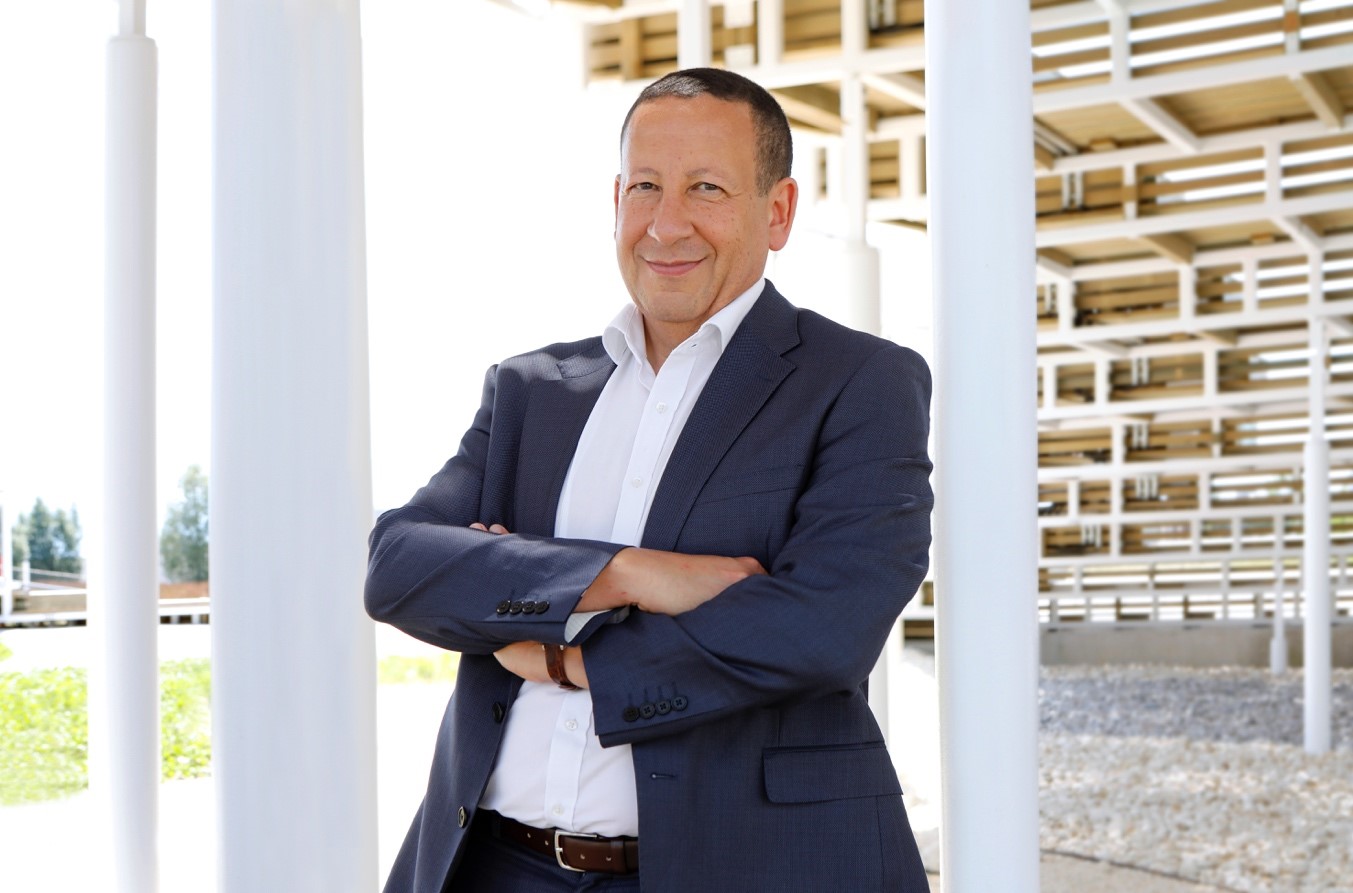
Lyesse Laloui, professor at EPF Lausanne and director of the Soil Mechanics Laboratory is awarded the prestigious Proof of Concept Grant (PoC) by the European Research Council (ERC). The grant adds up to the breakthrough developments achieved within the first 18 months of his previous advanced ERC-funded BIOGEOS project which is developing novel bio-cementation technologies for civil, geotechnical and geo-environmental works. The ERC PoC grant further validates the technology-transfer vision of the BIOGEOS project and accelerates its aim to develop complete and industry-ready solutions to serve infrastructure, economic and societal needs.
ERC Proof of Concept (PoC) Grants provide lump-sum funding to academics who have demonstrated breakthrough advances towards exploring the societal and economic potential of their discoveries. By providing additional resources, the grants consolidate the achievements of ERC-Advanced grants, funded under the EU’s research and innovation programme, Horizon 2020.
CEBREWA (Construction & Environmental Biocementation in REal World Applications) tackles the emerging ground stabilisation problems which are becoming increasingly pressing in construction and environmental engineering. Ground stabilization mitigates stability risks associated with geohazards, such as earthquakes, soil erosion, and landslides. Such problems are expected to be further intensified by extreme weather and aging infrastructure. Traditionally, ground stabilization is applied to roads, railroads, airfields, embankments, reservoirs, bank protection, canals, dams, and coastal engineering. Rapid urbanization, particularly in developing regions, is fueling the ground stabilization market growth. This is primarily due to: (i) the scarcity of suitable land for development and (ii) the need to extend existing infrastructure (typically by building more floors, and therefore increasing the loads sustained by foundations) to support increasing populations in urban zones. The market of ground stabilization has not been disrupted for decades, with current solutions complex and expensive, mainly due to the heavy equipment required for their application, and often hazardous to the environment, as they rely on the extensive use of industrial fluids or microplastics. The latter is especially prevalent in polyurethane-based solutions, which are currently used as expansive polymer foams in foundation repair works. Another problematic aspect of existing solutions is related to the level of energy required on-site to generate the high pressures required to inject the above stabilizing agents into the ground. Further, from an environmental perspective, existing fly ash-, lime-, and cement-based solutions generate pH-levels above 12. Such conditions are above the typical values of soil pH, and they cause irreversible damage to the groundwater and subsurface ecosystem. Therefore, a market gap exists, and CEBREWA aims to fill it with the innovative ground bio-stabilization solutions based on innovative carbonate biomineralization which is developed and patented during BIOGEOS.
Source: Soil Mechanics Laboratory